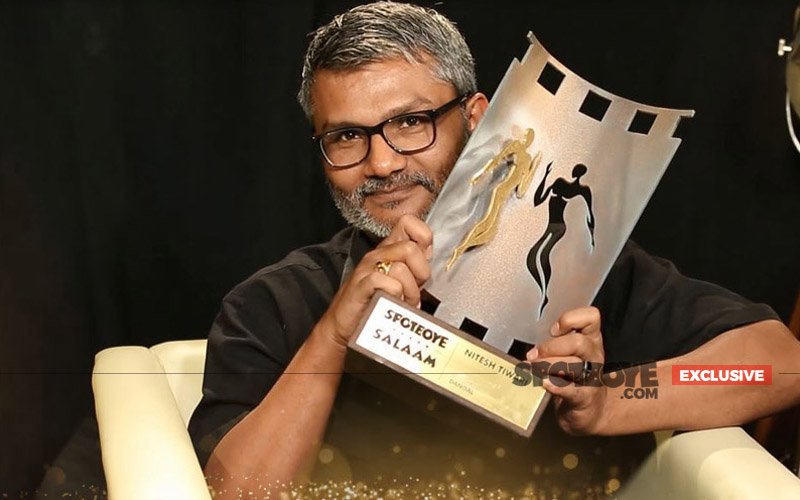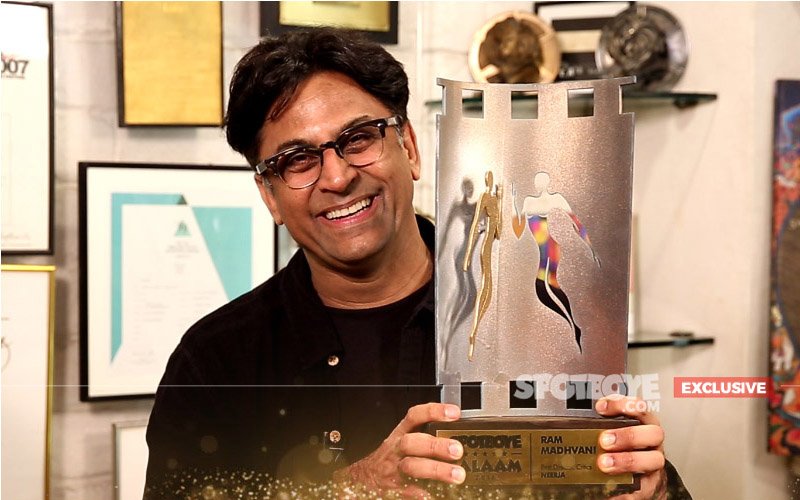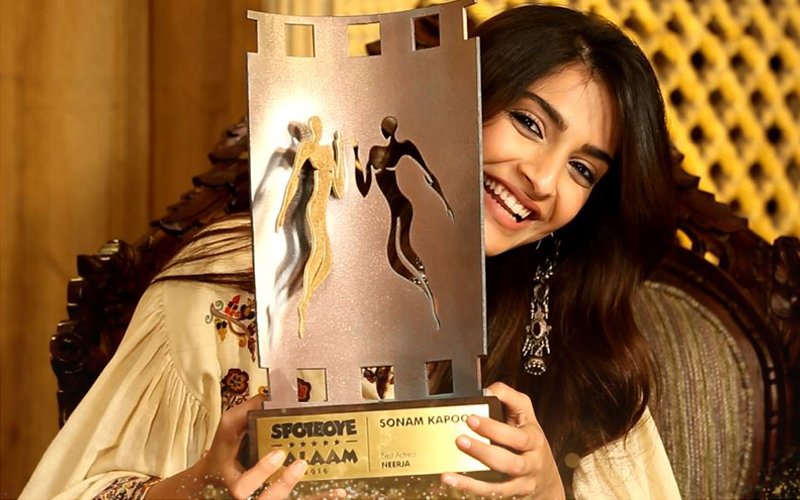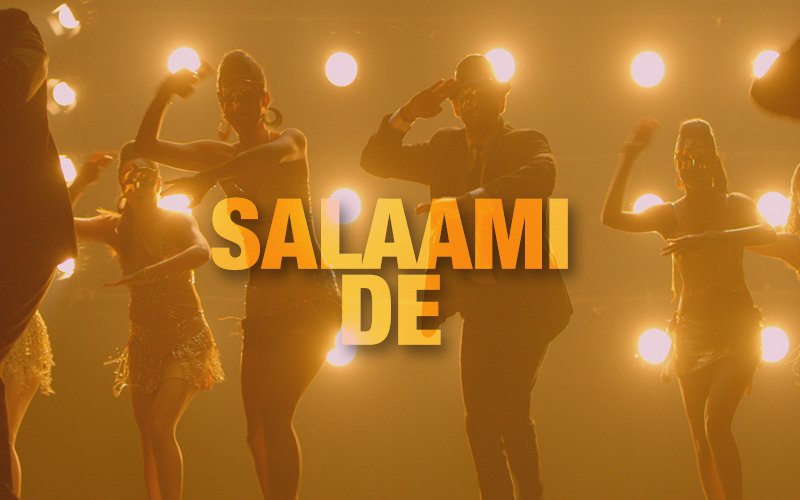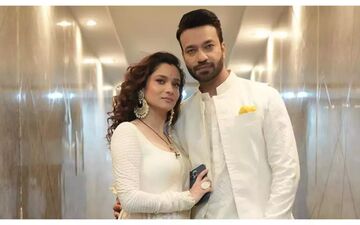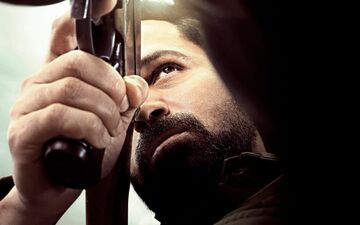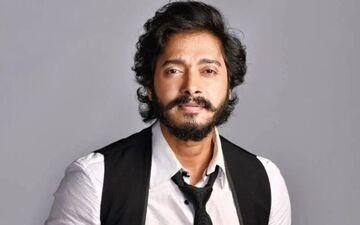Shakun Batra: We Kept Fawad Khan’s Character Subtle Because We Were Tired Of Films Caricaturing Gays
The story of Kapoor & Sons was extremely relatable, courtesy the talented duo- Shakun Batra & Ayesha DeVitre- the winners of SpotboyE Salaam, Best Story. In conversation with film critic & author Khalid Mohamed, the writers talk about their journey and the challenges they faced to churn out an award-winning story...
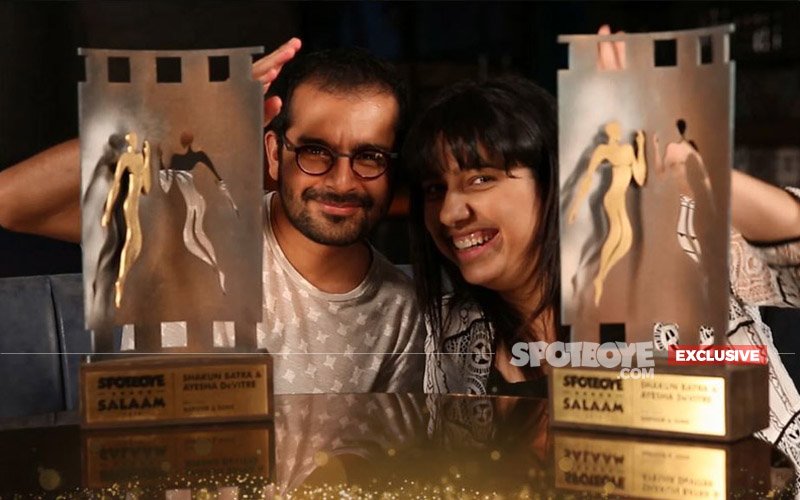
They say that the story of a film is its backbone- an ingredient most essential if you want to cook a sellable dish.
Kapoor & Sons is not only remembered for its amazing performances but also for an impeccable storyline.
We presented the SpotboyE Salaam for Best Story to Shakun Batra and Ayesha DeVitre- the duo who brought these unforgettable characters to life and weaved them together in a beautiful story.
Excerpts from the conversation that followed:
Did you both write the script beforehand and give it to Karan Johar or was it that he commissioned it to you'll together?
Shakun: No, Karan is family and that’s why he is always aware of what we are doing. Having said that, I don’t like to exchange anything unless I have a draft worth sharing- so that’s how we work. We finish a draft and then we give it to our close friends and Karan. We get their feedback and then send out a revised draft to them again. On an average, we have three rounds and usually by the third draft, we are happy.
So, how many drafts did Kapoor & Sons have?
Shakun: Many! If I were to consider big revisions, then may be four or five.
Ayesha: We have lost count.
Did those revisions also include Karan’s inputs?
Shakun: Not just him, everyone had their inputs. We talked about each and everything and kept going back and forth. It’s tough. I can’t even remember what Ayesha’s inputs were.
Ayesha: You actually lose perspective about who gave what idea because you are just constantly writing and revising things.
Shakun: But he is great. The thing I love about Karan is that his feedback always comes from an emotional instinct. It’s amazing how he gets into it. He will give you a very emotional feedback and then he completely leaves it on you to figure out.
Ayesha: Another amazing thing about Karan is that, very often people find problems with the script, but they can’t give you solutions. Karan will give you 20 options which will really help you think.
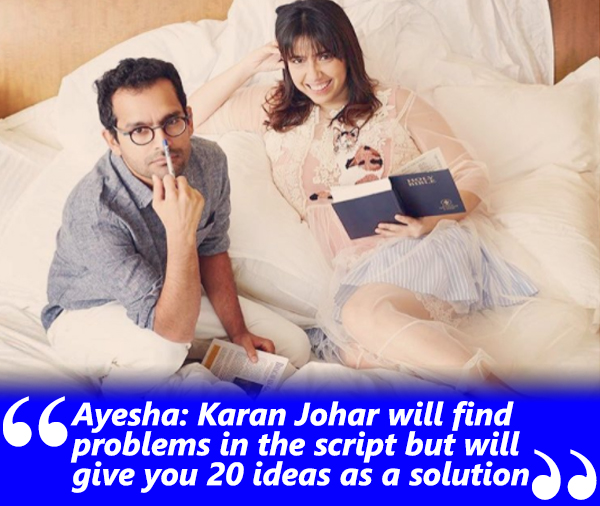
Image Source: instagram/ayeshadevitre
Do you argue with Karan sometimes about these changes?Shakun: No, he doesn’t force you at all. He says, ‘listen this is what I think and now you go figure out how you will solve it’. So, Kapoor & Sons’ first draft (may be the last 30-40 pages) have been completely rewritten. We along with our friends Imran and Avantika had a long meeting with Karan, where we all were trying to come up with a new ending for the film and eventually it turned into a completely different thing from the original.
You think that Rajat Kapoor’s character had to die? Or you had other thoughts about this?
Ayesha: Yes…
Shakun: …but Rishi Sir’s character had to die in the original script.
So what made you switch the deaths?
Ayesha: When we had written about Rishi Kapoor’s character’s death, we felt very strongly that when a person is old and has a natural death, it’s not really a wake-up call for people because with age you are expecting it. But when someone in the prime dies, it wakes you up and suddenly you start looking at life and relationships differently. You start re-looking at things that are petty and not petty and you start realizing what is really important in life. So, Rajat’s character, even though he had messed up in such a big way by having an extra-marital affair, in the larger picture he was only human.
What do you think about the use of coincidences in the film- like Fawad Khan’s character sees his father’s car parked outside, following which the whole thing explodes. Do you believe in coincidences?
Shakun: I do, but only if they are believable coincidences. Here, Fawad’s character sees the car but he notices it because it’s a banged car which they had hit a night before. It’s easier to notice because in Coonoor you will just not read a number plate and stop. It was completely hit from the front, which is why he notices it.
Ayesha: Secondly, Coonoor is a very small place; it’s not like Mumbai where people are driving around.
Shakun: You have been to Coonoor and you know how it is. If you were driving a car the night before which you banged and next morning if you saw it parked somewhere, you will stop and notice. It’s not a crowded city; it’s a city with as many people.
What about the same gender relationship? Did you intentionally keep it subtle? For instance, there is a very distant shot of Fawad and the person he is in love with, so was it to be subtle or not to be controversial?
Shakun: Both. There are two things. One I was tired of the way gays are caricatured in our films and I really wanted to go completely the other way and say that listen we can tell stories about them without being sensational about it. I didn’t want to sell the film on that basis alone.
Ayesha: It wasn’t about a guy coming out of the closet.
Shakun: Secondly, I think the easiest way to have people change their mind is to give them something in a palatable way. So, if I kept using the word gay or homosexual, it would have sensationalized it, and gone against to what I wanted to do. I wanted families to come in and realize that this is how it is.
Ayesha: And that’s what happened. We were surprised that a lot of mothers who watched the film said things like, ‘If tomorrow I find out my son is gay, maybe I would deal with it differently. After watching the film, I realized it’s not so bad and it’s not his fault’- that was the idea behind it.
Was there any kick-off point for the story?
Shakun: Yeah I think she (Ayesha) had a germ for the story. She wanted to make a film based on siblings where one is perfect and the other is imperfect…
Ayesha: …basically on preferential treatment in families. So, I had thought of a story based on the relationship of a brother and sister, where one is preferred over the other. Then, we wanted to deal with a dysfunctional family because honestly every family is dysfunctional in its own way.
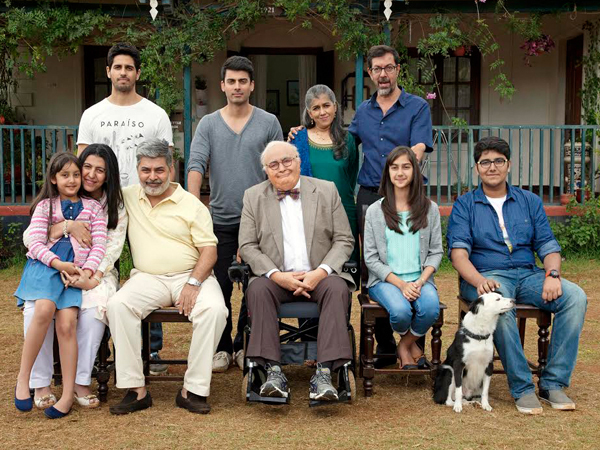
Image Source: youtube/DharmaMovies
So, are there shades of any members of your family in the film?Shakun (laughs): Yeah.
And who are they?
Shakun: Everyone. I felt most of these emotions…
Whom did you feel closest to?
Shakun: My sister. She has always felt that I am the preferred child and she doesn’t get the same importance.
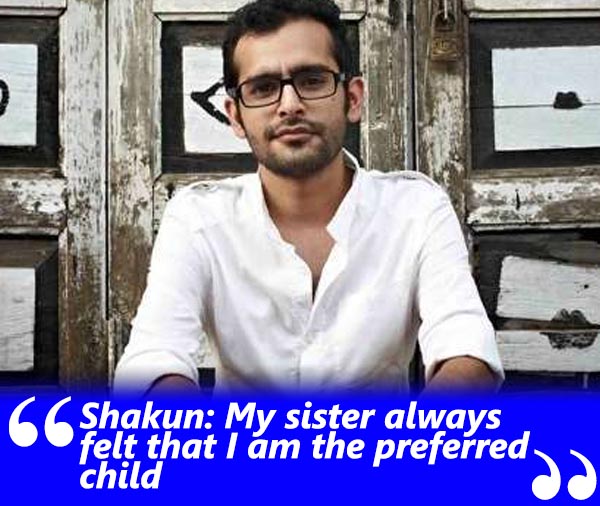
Image Source: voiceoftrust
Is it because you are a male?Shakun: No, because I am the youngest one, which is why my mother has showered a lot of love on me. My sister also wanted to go to a film school but my parents allowed me and not her. She held this against my parents for a long time. So, these kinds of things can play a big role in your psyche. I have seen families fight and when I was writing and directing the film, I really wanted fights to feel real because otherwise it’s always two people standing in a room and just shouting at each other, but that’s not how it usually is. The chaos does not feel real, the madness does not feel real. In your house you are generally finishing some work and fighting and I wanted that kind of chaos to come through.
Ayesha, what about your family?
Ayesha: My family is a very happy one. Most are opinionated, so we fight a lot.
But are you the preferred child?
Ayesha: No, my parents are quite fair (surprisingly) but I don’t know if my sister would agree to that. I think dadaji (played by Rishi Kapoor) would come closest to my family because we are all crazy. You know Parsis in general are crazy.
Why do you say that?
Ayesha: We are a crazy lot. We don’t have boundaries. You come for a family party and you have people playing guitar and singing. There are always themes at our family parties. So, the grandfather’s craziness in the way he just shoots his mouth off is something that every family member of mine has been doing over generations.
So, is the grandfather a synthesis of your grandparents?
Shakun: Not for me. But it would have been amazing to have a grandfather like him.
Ayesha: My grandfather was amazing. He was fun and always pushed the envelope.
But we all love our grandparents…
Shakun: Yes, but my grandfather didn’t smoke or drink with me, I like that idea…
Ayesha (interrupts): My grandfather smoked.
Shakun: …of an old man just smoking under a duvet with his grandchildren.
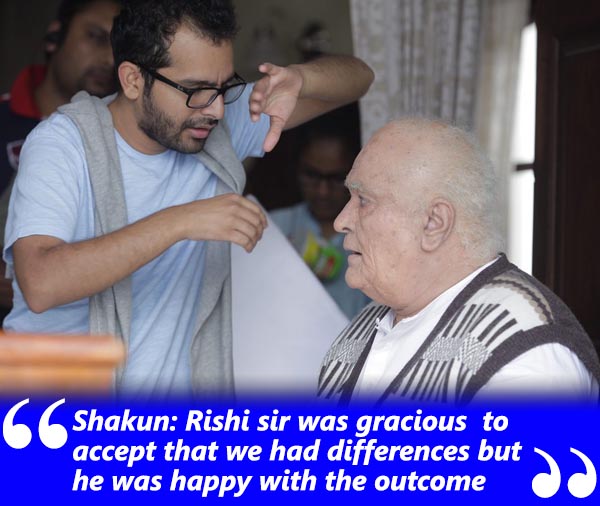
Image Source: twitter/kapoorandsons_
I remember coming to Coonoor to see the shoot and Rishi Kapoor was blowing his (marijuana) stack because you took too many takes. Was it a pleasure or pain to deal with him?
Shakun: In retrospect it was all worth it. I think he and I had differences and arguments but now we are really good friends. I only have gratitude for everything he did for the film. He was extremely gracious to go out there and say we had fights, maybe we didn’t see things the same way but he is happy with the way the film has turned out. I am happy with his performance, so let bygones be bygones. We come from completely different schools of filmmaking- I don’t come from a place where a film is shot with various camera angles, like wide, mid and close- I want everyone in the room to be in their characters at all times, so that I can move the camera from one face to the other, anytime I want.
But you do take too many shots right?Shakun: But I use all of them. So, if you see the plumber fight, I wanted to give a sense of chaos that families have when they are together and you can’t give that sense of energy and chaos by just focusing on one or two shots. You want to show five things that are happening in the room at the same time. While the grandfather is talking to the kid, the mother is trying to sort out the kitchen- so you have to show that chaos and to design it you need to go with the flow.
Ayesha, did you take any of Rishi Saab’s anger?
Shakun (interrupting): No, he never shouted at her.
Ayesha: I loved him. He never shouted at me. Once, I remember I wanted to fix his wig, as I was also the hairstylist on the film- I had the headphones on behind the monitor, so I ran quickly and I fixed the wig. As he used to keep forgetting that I have also written the film, he asked me, ‘why do you need headphones to fix my hair?’ To which I said, ‘Sir, I have also written the film’. He then questioned me and said, ‘So which dialogue did I say wrong in the last bit?’, then I told him that all lines were not correct and he asked why didn’t I correct him. So I said, ‘Sir, because the gist was there of what we wanted you to say’. He was very happy and said, ‘Fantastic. This is new form of filmmaking.’ At this point of time, he would appreciate it and would give you a pat on the back. So, he was lovely.
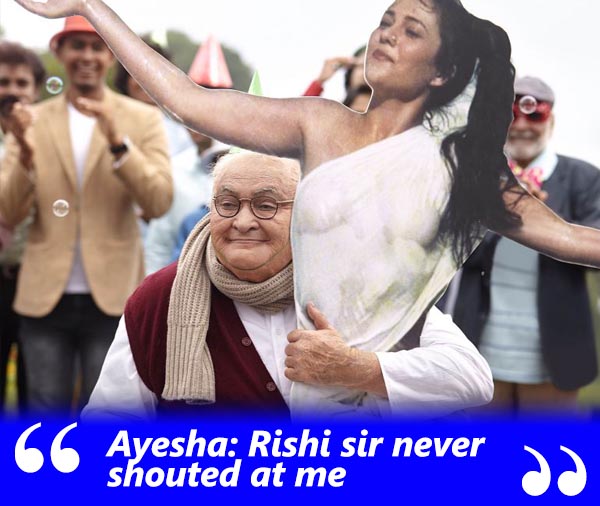
Image Source: youtube/DharmaMovies
Is there a shade of Monsoon Wedding in Kapoor & Sons?Shakun: Yeah. I am a big fan of Monsoon Wedding. It’s not there in the plot of Kapoor & Sons but I think there are that many family films with that tonality and Monsoon Wedding does fall in that category. It just comes from my love for Woody Allen films or a movie like Monsoon Wedding. It just seeps in, it’s not something I try and imitate.
Kapoor & Sons is not only remembered for its amazing performances but also for an impeccable storyline.
We presented the SpotboyE Salaam for Best Story to Shakun Batra and Ayesha DeVitre- the duo who brought these unforgettable characters to life and weaved them together in a beautiful story.
Excerpts from the conversation that followed:
Did you both write the script beforehand and give it to Karan Johar or was it that he commissioned it to you'll together?
Shakun: No, Karan is family and that’s why he is always aware of what we are doing. Having said that, I don’t like to exchange anything unless I have a draft worth sharing- so that’s how we work. We finish a draft and then we give it to our close friends and Karan. We get their feedback and then send out a revised draft to them again. On an average, we have three rounds and usually by the third draft, we are happy.
So, how many drafts did Kapoor & Sons have?
Shakun: Many! If I were to consider big revisions, then may be four or five.
Ayesha: We have lost count.
Did those revisions also include Karan’s inputs?
Shakun: Not just him, everyone had their inputs. We talked about each and everything and kept going back and forth. It’s tough. I can’t even remember what Ayesha’s inputs were.
Ayesha: You actually lose perspective about who gave what idea because you are just constantly writing and revising things.
Shakun: But he is great. The thing I love about Karan is that his feedback always comes from an emotional instinct. It’s amazing how he gets into it. He will give you a very emotional feedback and then he completely leaves it on you to figure out.
Ayesha: Another amazing thing about Karan is that, very often people find problems with the script, but they can’t give you solutions. Karan will give you 20 options which will really help you think.

Image Source: instagram/ayeshadevitre
Do you argue with Karan sometimes about these changes?
You think that Rajat Kapoor’s character had to die? Or you had other thoughts about this?
Ayesha: Yes…
Shakun: …but Rishi Sir’s character had to die in the original script.
So what made you switch the deaths?
Ayesha: When we had written about Rishi Kapoor’s character’s death, we felt very strongly that when a person is old and has a natural death, it’s not really a wake-up call for people because with age you are expecting it. But when someone in the prime dies, it wakes you up and suddenly you start looking at life and relationships differently. You start re-looking at things that are petty and not petty and you start realizing what is really important in life. So, Rajat’s character, even though he had messed up in such a big way by having an extra-marital affair, in the larger picture he was only human.
What do you think about the use of coincidences in the film- like Fawad Khan’s character sees his father’s car parked outside, following which the whole thing explodes. Do you believe in coincidences?
Shakun: I do, but only if they are believable coincidences. Here, Fawad’s character sees the car but he notices it because it’s a banged car which they had hit a night before. It’s easier to notice because in Coonoor you will just not read a number plate and stop. It was completely hit from the front, which is why he notices it.
Ayesha: Secondly, Coonoor is a very small place; it’s not like Mumbai where people are driving around.
Shakun: You have been to Coonoor and you know how it is. If you were driving a car the night before which you banged and next morning if you saw it parked somewhere, you will stop and notice. It’s not a crowded city; it’s a city with as many people.
What about the same gender relationship? Did you intentionally keep it subtle? For instance, there is a very distant shot of Fawad and the person he is in love with, so was it to be subtle or not to be controversial?
Shakun: Both. There are two things. One I was tired of the way gays are caricatured in our films and I really wanted to go completely the other way and say that listen we can tell stories about them without being sensational about it. I didn’t want to sell the film on that basis alone.
Ayesha: It wasn’t about a guy coming out of the closet.
Shakun: Secondly, I think the easiest way to have people change their mind is to give them something in a palatable way. So, if I kept using the word gay or homosexual, it would have sensationalized it, and gone against to what I wanted to do. I wanted families to come in and realize that this is how it is.
Ayesha: And that’s what happened. We were surprised that a lot of mothers who watched the film said things like, ‘If tomorrow I find out my son is gay, maybe I would deal with it differently. After watching the film, I realized it’s not so bad and it’s not his fault’- that was the idea behind it.
Was there any kick-off point for the story?
Shakun: Yeah I think she (Ayesha) had a germ for the story. She wanted to make a film based on siblings where one is perfect and the other is imperfect…
Ayesha: …basically on preferential treatment in families. So, I had thought of a story based on the relationship of a brother and sister, where one is preferred over the other. Then, we wanted to deal with a dysfunctional family because honestly every family is dysfunctional in its own way.

Image Source: youtube/DharmaMovies
So, are there shades of any members of your family in the film?
And who are they?
Shakun: Everyone. I felt most of these emotions…
Whom did you feel closest to?
Shakun: My sister. She has always felt that I am the preferred child and she doesn’t get the same importance.

Image Source: voiceoftrust
Is it because you are a male?
Ayesha, what about your family?
Ayesha: My family is a very happy one. Most are opinionated, so we fight a lot.
But are you the preferred child?
Ayesha: No, my parents are quite fair (surprisingly) but I don’t know if my sister would agree to that. I think dadaji (played by Rishi Kapoor) would come closest to my family because we are all crazy. You know Parsis in general are crazy.
Why do you say that?
Ayesha: We are a crazy lot. We don’t have boundaries. You come for a family party and you have people playing guitar and singing. There are always themes at our family parties. So, the grandfather’s craziness in the way he just shoots his mouth off is something that every family member of mine has been doing over generations.
So, is the grandfather a synthesis of your grandparents?
Shakun: Not for me. But it would have been amazing to have a grandfather like him.
Ayesha: My grandfather was amazing. He was fun and always pushed the envelope.
But we all love our grandparents…
Shakun: Yes, but my grandfather didn’t smoke or drink with me, I like that idea…
Ayesha (interrupts): My grandfather smoked.
Shakun: …of an old man just smoking under a duvet with his grandchildren.

Image Source: twitter/kapoorandsons_
I remember coming to Coonoor to see the shoot and Rishi Kapoor was blowing his (marijuana) stack because you took too many takes. Was it a pleasure or pain to deal with him?
Shakun: In retrospect it was all worth it. I think he and I had differences and arguments but now we are really good friends. I only have gratitude for everything he did for the film. He was extremely gracious to go out there and say we had fights, maybe we didn’t see things the same way but he is happy with the way the film has turned out. I am happy with his performance, so let bygones be bygones. We come from completely different schools of filmmaking- I don’t come from a place where a film is shot with various camera angles, like wide, mid and close- I want everyone in the room to be in their characters at all times, so that I can move the camera from one face to the other, anytime I want.
But you do take too many shots right?
Ayesha, did you take any of Rishi Saab’s anger?
Shakun (interrupting): No, he never shouted at her.
Ayesha: I loved him. He never shouted at me. Once, I remember I wanted to fix his wig, as I was also the hairstylist on the film- I had the headphones on behind the monitor, so I ran quickly and I fixed the wig. As he used to keep forgetting that I have also written the film, he asked me, ‘why do you need headphones to fix my hair?’ To which I said, ‘Sir, I have also written the film’. He then questioned me and said, ‘So which dialogue did I say wrong in the last bit?’, then I told him that all lines were not correct and he asked why didn’t I correct him. So I said, ‘Sir, because the gist was there of what we wanted you to say’. He was very happy and said, ‘Fantastic. This is new form of filmmaking.’ At this point of time, he would appreciate it and would give you a pat on the back. So, he was lovely.

Image Source: youtube/DharmaMovies
Is there a shade of Monsoon Wedding in Kapoor & Sons?
